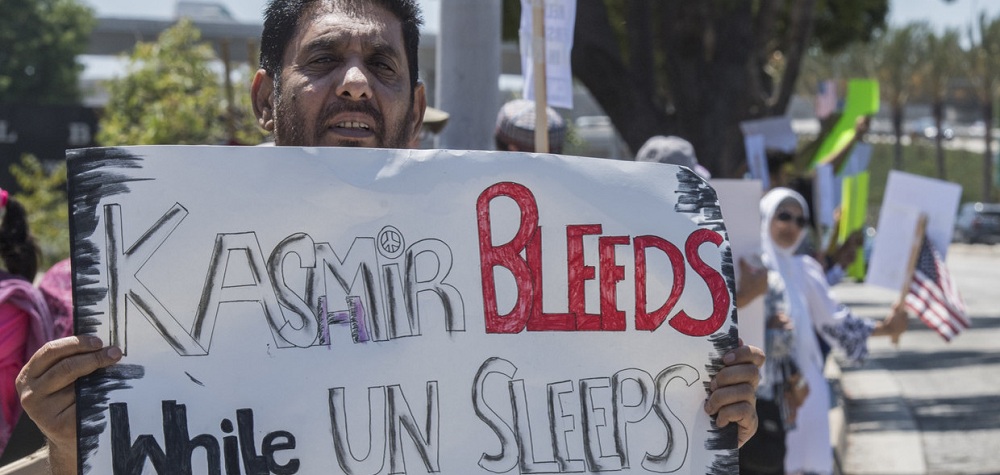Alwaght- Kashmir blockade is now three-months-old and the majorly Muslim residents of the disputed region still leave in their worst conditions as their most basic rights are been brazenly violated by the Indian forces.
The Organization for Islamic Cooperation has recently called for an end to the violation of human rights by India there. A recent meeting of the Human Rights Committee of the OIC especially held to address the situation in Kashmir insisted that Kashmir’s fate should be determined by its people and that India should not make a decision for millions of residents of the region.
The committee highlighted the house detention of the Kashmiri people since August 5 as the Indian government sent troops to impose martial law there. The OIC body called blockade “repugnant” and asked New Delhi to lift it.
It also blasted massive use of shotguns and tear gas to disperse the protests. It added that the shotguns so far blinded tens of thousands of Kashmiri people.
Compounding crisis
Jammu and Kashmir region is now much like a military zone as all of its parts are strictly controlled by the Indian troops.
Three months ago, the Indian government stripped Kashmir of its autonomy, in place since the 1940s. India’s Minister of Home Affairs Amit Shah said that it was a government decision and the next step will be altering the article 370 of the constitution that facilitates the autonomy of Kashmir. By revoking this article, Kashmir will lose its privileges for independently having a premier and parliament.
Almost all of Kashmiris protested the move, but a heavy military deployment does not allow for gatherings. The government has lately dispatched 10,000 new troops and throttled phone and internet services there.
After Indian independence and separation of Pakistan, the two countries struggled over Kashmir, fighting several wars. A line of control now separates India from Pakistan in Kashmir which through all years of war and tensions managed to save its autonomy.
Changing Kashmir into second West Bank
The article 370 of the constitution guarantees semi-autonomy and some exclusive rights for Kashmir. On October 31, this article was revoked by the Indian government. This project appears to serve ambitions of hard-liner Hindus who seek a demographic change in Kashmir in a major blow to the Muslim majority. Over the past years, the government constructed towns peculiar to the Hindus in Kashmir. The new towns draw concerns of the Muslims who fear their territories can be another West Bank which is occupied by Israel and home to Israeli settlements. Demographic change in Kashmir in favor of Kashmir is the goal the extremist Hindus have been following for years. The significance of a demographic change in Kashmir rests in the reality that Kashmir is the only region in India with a Muslim majority. Now with the new law, the region has no independent constitution, namely it has to follow the national Indian constitution like other states. The new law allows all Indians to buy homes and lands in Kashmir.
Political silence in the face of oppression
The situation in Kashmir is tense these days as the siege remains in place. The Indian forces target any crowds turning out to demonstrate.
A precise figure of the casualties remains unclear as the government keeps disrupting phone and internet services. However, reports emanating from there note that severe poverty and medical services equipment shortage are covering Kashmir.
Despite this oppression, the international community keeps turning a blind eye.
UN and international organizations silence: Certainly, breaching human rights and imposing a blockade on Kashmir represents a blatant violation of the UN resolutions and conventions addressing human rights.
1948 and 1949 UN resolutions gave Muslim-majority regions of Kashmir to Pakistan and Hindu-majority to India. They also decided that in a peaceful and neutral atmosphere a referendum should be held to allow the Kashmiri people to decide which side they want to join. Before the referendum, Kashmir is neither an Indian nor a Pakistani region.
The Indian government’s decision to annex Kashmir openly violated UN resolutions. The UN has so far failed to take effective actions to stop the Indian arrangement, however.
When it comes to the substantial violation of human rights, the related organizations, including the Human Rights Council, Amnesty International, and Human Rights Watch, remained silent.
State silence: Western and Muslim countries are also under blame as they remain silent to the Indian clampdown on the Kashmiri Muslims. Except for Pakistan that is highly sensitive to Kashmir developments, Muslim world reactions have been limited to Iran and Turkey. Such Arab countries as Saudi Arabia, Egypt, and Qatar chose silence. After the iron fist policy India showed to the Kashmiris, the Indian PM talked over the phone with the Saudi King Salman bin Abdulaziz. Saudi ruler did not raise the Kashmir case in the talks, demonstrating that the Kashmir issue is outweighed by the Indian-Saudi political ties.
Even the Western countries, which always claim to defend human rights and democracy, declined to effectively address the case. President Donald Trump of the US commented on the developments saying that Kashmir dispute is an Indian-Pakistani case and his administration does not enter it. Apparently, political and economic interests keep the US and Europe from showing a serious reaction that can risk tensions with New Delhi. The US looks at India as a partner in rivalry with China and does not want Indian leaders to distance New Delhi from the shared camp with Washington.
The inaction to the Indian violation of the human rights in Kashmir which automatically means the violation of UN resolutions is politically-motivated. Simply, Kashmir’s people are victims of political relations.



























